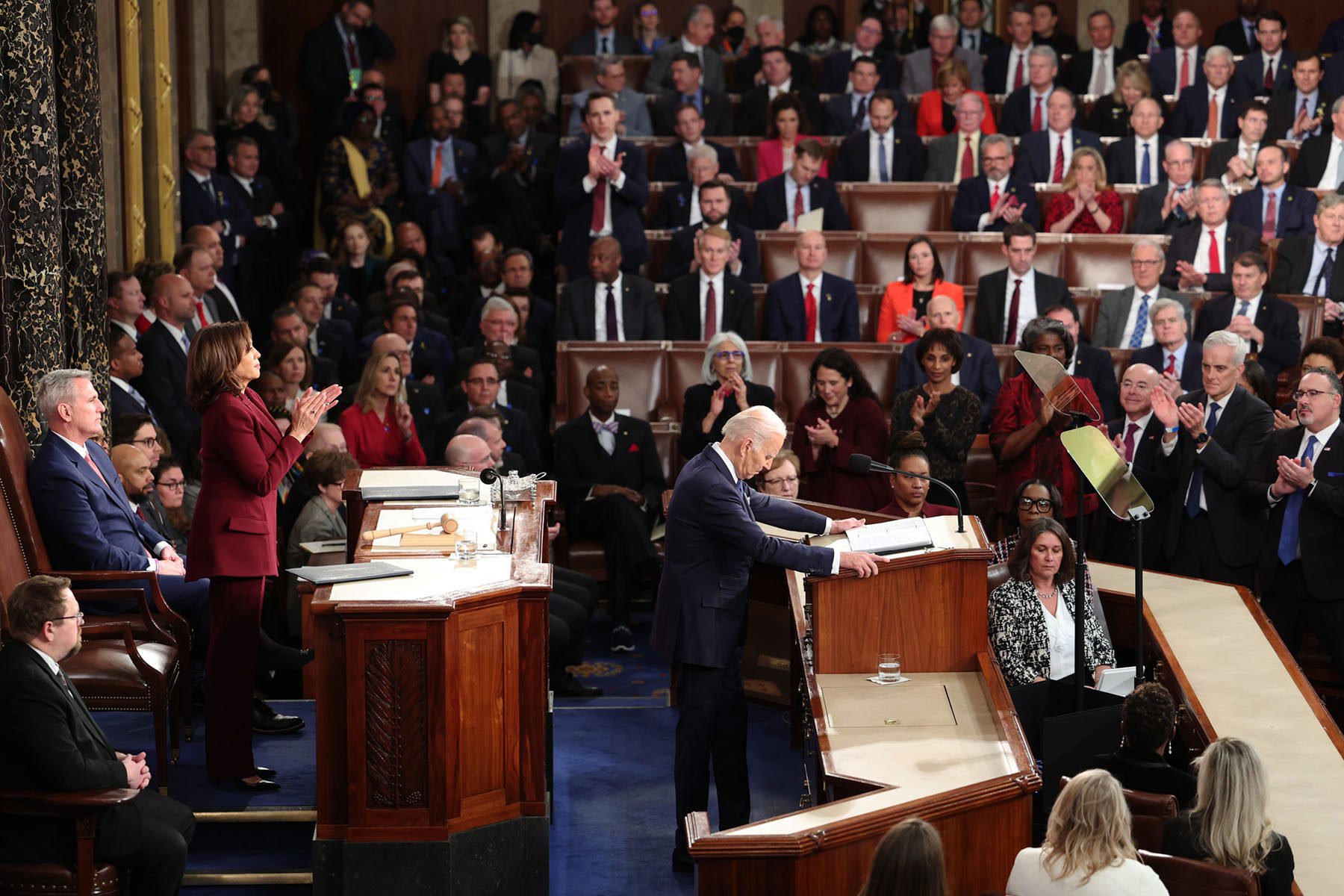We’re answering the “how” and “why” of abortion news. Subscribe to our daily newsletter.
President Joe Biden used the word “abortion” — one he has rarely uttered in speeches —in his brief remarks on the issue in his State of the Union address on Tuesday. He again called on federal lawmakers to restore the protections of Roe v. Wade and slammed “extreme” abortion bans.
It was Biden’s first State of the Union address since the Supreme Court ended nearly 50 years of federal abortion protections in its June decision in Dobbs v. Jackson Women’s Health Organization.
“The vice president and I are doing everything we can to protect access to reproductive health care and safeguard patient privacy. But already, more than a dozen states are enforcing extreme abortion bans,” he said. “Make no mistake about it: If Congress passes a national abortion ban, I will veto it.”
Biden has experienced a significant evolution in his views on abortion over his 50 years in politics, from voting for an amendment that would have allowed states to invalidate Roe v. Wade in the early 1980s to now forcefully rebuking its overturn. Unlike in his remarks to joint sessions of Congress in 2021 and 2022, the president used the word “abortion” twice in his speech.
Though Biden said in his speech that Congress “must restore the right the Supreme Court took away last year and codify Roe v. Wade,” the chances of passing any legislation through the divided Congress are near zero.
But many advocates argue that Roe was never sufficient to begin with — and they want the Biden administration and other policymakers to go even further in aggressively shoring up not just the legal right to abortion but the ability of patients, particularly low-income ones, to access to the procedure.
“Restoring those protections are not enough to solve the escalating abortion access crisis that we are facing and, honestly, have faced for many decades,” Morgan Hopkins, executive director of abortion advocacy group All Above All, said ahead of the speech. “We want to hear some concrete and bigger, bolder solutions than just restoring Roe.”
Both Hopkins and Rep. Lois of Frankel of Florida, a Democrat, said they hope Biden would explicitly link the loss of reproductive freedoms to economic security. The overturning of Roe v. Wade coincided with an ongoing caregiving crisis and skyrocketing costs of child care in the United States.
“When the president says ‘we’re not finished yet, we still have more work to do,’ I’m expecting and I hope that he will talk about fixing the broken care industry by the federal government investing in it,” Frankel, chair of the Democratic Women’s Caucus, said in an interview.
In his speech, Biden also appealed to Congress to bolster paid family and medical leave and to restore the expanded child tax credit, which lifted millions of children out of poverty but expired at the end of 2021.
“Let’s also make sure working parents can afford to raise a family with sick days, paid family and medical leave, and affordable child care that will enable millions more people to go to work,” he said.
In the months since Roe was overturned, over a dozen Republican-controlled states have banned or heavily restricted abortion access. Anti-abortion advocates are lobbying for more abortion restrictions at the federal and state levels and are fighting to undercut access to medication abortion.
Abortion advocates and opponents are awaiting a ruling as soon as this week from a conservative federal judge in Texas that could stop the distribution of mifepristone, a common medication used in first-trimester abortions the Food & Drug Administration first approved for use in 2000. The FDA also issued guidance in January authorizing retail pharmacies to dispense the drug for the first time, drawing pushback from officials in some GOP-controlled states.
The Biden administration has responded to the Dobbs decision, which sent abortion back to the states, with a series of executive orders and other actions aimed at expanding access to medication abortion and federally funded contraception services, ensuring patient privacy, protecting the rights of patients to travel across state lines and disseminating accurate information about abortion.
“The attacks on abortion access are not stopping and so they need to be constantly reassessing what they can do and what actions are available to them,” Hopkins said of the administration. Biden, she added, “has a responsibility to use his platform to educate the American people about the landscape of abortion access right now.”
And with limited means to meaningfully combat the loss of federal abortion protections, the White House’s most powerful tool may be the bully pulpit.
Vice President Kamala Harris, in particular, has taken on a leading role in helming the administration’s response to the decision with a series of stakeholder events and public speeches. She marked the 50th anniversary of the Roe decision in January with a speech in Tallahassee, Florida, targeting Gov. Ron DeSantis, a high-profile foe of the White House, and decrying abortion bans as “attacking the very foundations of freedom.”
Several abortion patients and advocates were in the audience for Tuesday’s State of the Union, the first since 2020 where members of Congress were each permitted to bring a guest.
Amanda Zurawski, who resides in Austin, Texas, was forced by her state’s abortion ban to wait days to receive proper medical care when her water broke at 18 weeks of pregnancy and she went into life-threatening sepsis as a result. She attended the State of the Union with her husband, Josh, as guests of First Lady Jill Biden.
Sen. Ed Markey and Reps. Susie Lee, Debbie Wasserman Schultz and Madeline Dean, all Democrats, also invited guests who publicly spoke out about their experiences receiving abortion care later in pregnancy when their pregnancies became non-viable. Gen Z for Change strategist Olivia Julianna, who raised millions for abortion funds in 2022, also attended as the guest of Rep. Nanette Barragan.
Frankel said she’s planning on working with the Biden administration to protect medication abortion where possible, shore up abortion access for military service members and federal employees, and ensure all patients have contraceptive care covered by the Affordable Care Act.
“Every way that the president can keep reproductive freedom alive and well in this country, we will be working with them,” Frankel said.






